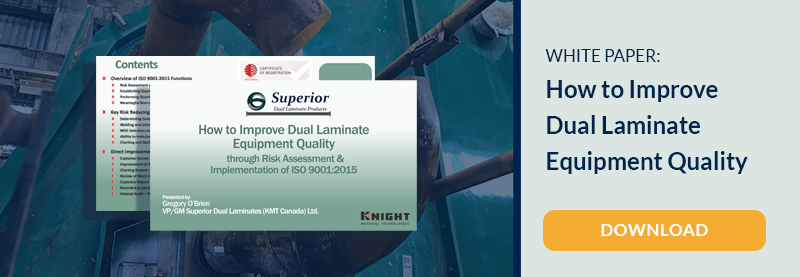Welded Steel Preparation for Fluoropolymer Linings
Published on: October 17, 2023 Topics: LiningsUnderstanding Electro Chemical Manufacturing’s (ECM) welded steel preparation process for fluoropolymer linings is important for engineers designing new or lining existing welded steel tanks, stacks, ducts and other fabrication equipment utilized in and vulnerable to severe corrosive environments. Engineers can to choose from a variety of lining options. The goal is to provide safe, durable and reliable corrosion protection at a reasonable cost.
The challenge, however, is to find a match between the operating environment and the best lining material the first time to avoid the high cost of failure. Some lining options, such as corrosion resistant alloys or glass linings, are often selected because they are the most costly and thus viewed as the lowest risk options. Unfortunately, these high-cost solutions sometimes fail due to chemical attack or physical breakage.
Watch our video on preparing welded steel equipment for fluoropolymer lining:
Fluoropolymer linings are a proven cost-effective solution in many corrosive environments. When properly selected, they are less prone to chemical attack and less fragile than other lining options. Fluoropolymer linings can also be repaired and replaced to extend the life span of the equipment they are protecting.
Fluoropolymers as a group are also known for:
- MFA-4-low-res chemical corrosion resistance
- Chemical permeation resistance
- Non-reactivity, making them ideal when high-purity standards must be met
- Temperature range
- Tensile strength
- Abrasion resistance
- Low electrical conductivity/interaction
- Non-stick properties
- Low coefficient of friction
- High impact tolerance
- Utility as both a liner and a coating
ECM works with the following partially and fully fluorinated polymers, making recommendations based on customer and application specifications.
- Kynar® PVDF (Arkema)
- Halar® ECTFE (Solvay)
- Tefzel® ETFE (Chemours)
- Teflon® PTFE-M (Chemours)
- Neoflon® FEP (Daikin)
- Hyflon® PFA (Solvay)
However, before a fluoropolymer lining can be applied to the steel tank, stack, duct or other fabricated equipment, specific process steps need to be completed.
ECM has developed a comprehensive step-by-step welded steel preparation process to help personnel deliver the equipment in the proper condition and avoid delays or additional costs to the project.
The following information explains how to prepare welded steel tanks, stacks, ducts or other fabricated equipment for fluoropolymer lining.
The main components of the process include Material, Dimensions, Construction, Welding and Grinding, Outlets, Domes and Fittings, Tests, Inspection, Rejection and Shipment. ECM also provides on-site lining work when needed.
Please use our process for additional detail, ASTM and ANSI mil tolerances and specific drawings.



